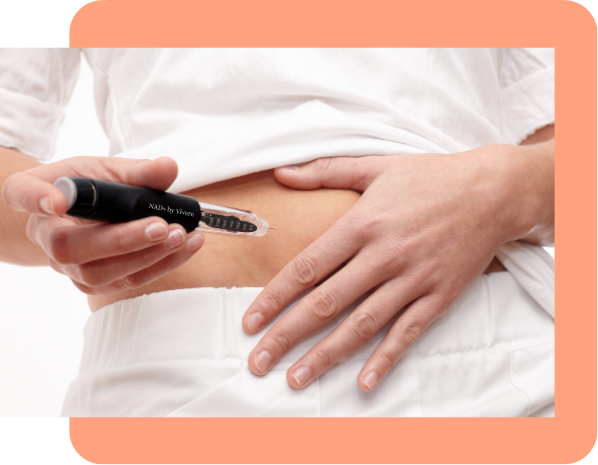Can NAD+ Affect Female Hormones?
Last Updated: 11 November 2025

The connection between female hormones and overall health is complex, involving a fine balance between reproductive function, metabolism and ageing. Recent research has started to uncover the role of NAD+ (nicotinamide adenine dinucleotide), a molecule essential for energy production and cellular repair, in this process. NAD+ levels naturally decline with age, but emerging evidence suggests this reduction could influence female hormonal health, particularly in relation to ovarian function, fertility and hormone regulation.
The insights provided in this article are from Vivere's Head of Nutrition, Yusra Serdaroglu Aydin, a registered dietitian with a background in nutrition, food engineering and culinary arts. Her approach is grounded in science and shaped by a strong understanding of personalised nutrition and the human microbiome.
Key Takeaways
Here are the five biggest takeaways from this article about whether NAD+ can affect female hormones:
NAD+ is a vital molecule that supports cellular energy, mitochondrial function and DNA repair.
Research suggests declining NAD+ levels are linked to ovarian ageing, reduced oocyte quality and hormone imbalance.
Maintaining NAD+ may help support ovarian health, improve fertility outcomes and regulate hormone secretion.
NAD+ influences mitochondrial efficiency, oxidative stress and cellular energy production, all of which affect female reproductive health.
Early studies show that NAD+ therapies could offer new ways to support female hormones, although more human research is needed.

The Relationship Between NAD+ and Ovarian Function
Ovarian Ageing
Ovarian ageing is a natural process characterised by a decline in egg number and quality, alongside changes in hormone production. Studies have shown that lower levels of NAD+ are closely associated with accelerated ovarian ageing, while restoring NAD+ levels may help slow this decline and improve ovarian health [1] [2].
Oocyte Quality
The quality of oocytes, or eggs, is critical for fertility. NAD+ is involved in mitochondrial function within oocytes, which directly impacts their energy supply and genetic stability. Research indicates that maintaining NAD+ levels may improve egg quality and potentially increase the chances of successful fertilisation and live birth [3] [2].
Hormone Secretion
Ovarian cells are responsible for secreting hormones such as oestrogen and progesterone. NAD+ helps regulate these processes through its role in energy metabolism and cellular signalling. Animal studies suggest that higher NAD+ levels may enhance ovarian hormone secretion and overall reproductive health [1].
Other Issues
Supplementation with NAD+ precursors may also provide a non-invasive treatment for a number of gynaecological diseases and may help with issues around spontaneous abortions and congenital malformations [4].
How Does NAD+ Influence Ovarian Health?
Mitochondrial Health
Mitochondria, the energy centres of cells, play a crucial role in ovarian function. NAD+ is essential for mitochondrial efficiency, and a decline in NAD+ leads to reduced energy production. This reduction may impair egg quality and ovarian reserve. By supporting mitochondrial health, NAD+ contributes to better reproductive potential [5] [2].
Cellular Energy
The reproductive system relies on high levels of cellular energy to maintain fertility. NAD+ drives many of the chemical reactions needed for energy production in ovarian and uterine cells. A drop in NAD+ can reduce cellular energy, which has been linked to ageing in reproductive tissues and reduced fertility [6].
Oxidative Stress
Oxidative stress, caused by an imbalance between free radicals and antioxidants, contributes to ovarian ageing and reduced egg quality. NAD+ is key for antioxidant defences in cells, meaning that sufficient NAD+ levels may protect ovarian cells from oxidative damage.
Influencing the Risk of PCOS
Polycystic ovary syndrome (PCOS) is a common hormonal condition that affects fertility, metabolism and overall well-being. Research indicates that NAD+ pathways may play a role in the metabolic and reproductive disturbances seen in PCOS. Supporting NAD+ function could offer benefits for women managing this condition [6].
Could NAD+ Therapies Support Female Hormones?
Scientists are now exploring whether therapies aimed at boosting NAD+ could help support female hormonal health. Animal and early human studies suggest that raising NAD+ levels may improve ovarian function, delay age-related fertility decline and enhance hormone balance [7] [1] [2].
Approaches being studied include NAD+ precursors such as nicotinamide riboside (NR) and nicotinamide mononucleotide (NMN), both of which help increase NAD+ availability in the body. While results are promising, more large-scale human trials are needed to confirm their effectiveness and safety in relation to female hormones.
At Vivere, we provide high-quality NAD+ supplementation in the form of Vivere's NAD+ pen. This pen injects premium-grade NAD+ subcutaneously for maximum absorption and results. Supplementing NAD+ using the Vivere NAD+ pen may provide a wide range of benefits, not only to female hormonal health but also to general well-being.
Final Thoughts from Yusra
"NAD+ is emerging as an important factor in female hormonal health, particularly in supporting ovarian function, fertility and hormone secretion. While research is still developing, maintaining healthy NAD+ levels through lifestyle and nutrition may offer long-term benefits for reproductive well-being and overall health. As science advances, NAD+ therapies could become valuable tools for women seeking to support their hormonal balance and reproductive health".
If you’re considering at-home NAD injection therapy, our beginner’s guide to NAD+ injections is a great place to learn more.
Vivere helps you take control of your health with personalised insights from state-of-the-art gut microbiome testing, nutritional guidance, science-backed supplements, NAD injections and expert support. Sign up today and start living better, for longer.
Sources
[3] NAD+ Repletion Rescues Female Fertility during Reproductive Aging - ScienceDirect
[4] Supplementation with NAD+ and its precursors: A rescue of female reproductive diseases - PMC
[6] A Molecular Perspective and Role of NAD+ in Ovarian Aging - PMC
Author

Yusra Serdaroglu Aydin, MSc RD
Head of Nutrition and Registered Dietitian
Yusra is a registered dietitian with a multidisciplinary background in nutrition, food engineering, and culinary arts. During her education, her curio...